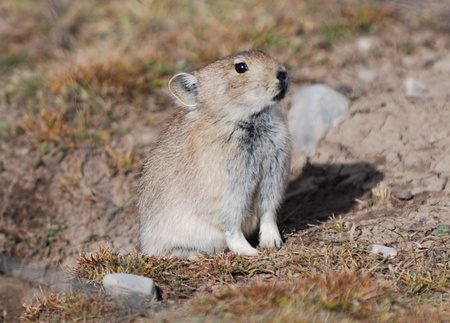Scientists from the University of Aberdeen School of Biological Sciences and the Chinese Academy of Sciences have completed a 13-year long investigation into the survival strategies of an enigmatic small mammal, the plateau pika, that lives on the Qinghai-Tibetan plateau in China.
Pika cannot hibernate and so their survival strategies are of interest: particularly in the context of how these might be impacted by future climate change. This is also economically important for indigenous Tibetan yak herders because pika are considered an agricultural pest that compete with domestic yak for food.
Their work, published today in the Journal Proceedings of the National Academy of Sciences, shows that pika suppress their energy demands and exploit an unusual food source – eating the feces of their competitor the yak.
The team of researchers measured daily energy expenditures of two wild study populations of the pika and found that energy expenditures are about 30% lower in winter. To determine how the pika achieve this reduction, the authors filmed the animals’ activities and implanted them with temperature logging devices. These data showed the while they don’t hibernate, they pika suppress their body temperatures – more so when it is colder.
Individuals living in areas with high densities of domestic yak populations were also observed eating yak feces, which the authors confirmed via analysis of stomach contents for yak DNA. According to the team, this more easily accessible and digestible food source could reduce the amount of time they need to forage and help explain why pika are more abundant in areas with yak, animals normally considered their competitors for food.
Professor John Speakman from the University of Aberdeen said “This study started as a small project about 15 years ago with what we thought was a simple question – how do they survive the winter? But it was more complex than we thought, and eventually included this intriguing finding that they eat yak poop. I guess when times are hard, they do what they have to, to survive.”
Professor Yanming Zhang from Chinese Academy of Sciences said: “Our interesting findings illustrate that plateau pikas wisely exploit yak feces as a resource which overcomes diet shortage and in other studies we have successfully shown that this increases their chances of surviving the winter to 94-96%.”
Professor DeHua Wang from the Chinese Academy of Sciences, added: “I have been interested in the physiological adaptation of plateau pikas to extreme environments (cold and hypoxia) for many years and some interesting questions such as what is the energy resource for this non-hibernating small lagomorph during the long cold winter. In this work we got some surprising results, pikas could suppress their body temperatures and reduce their energy expenditure in the cold. More interesting, some pikas used yak feces as their potential energy resource during the harsh winter time.”


